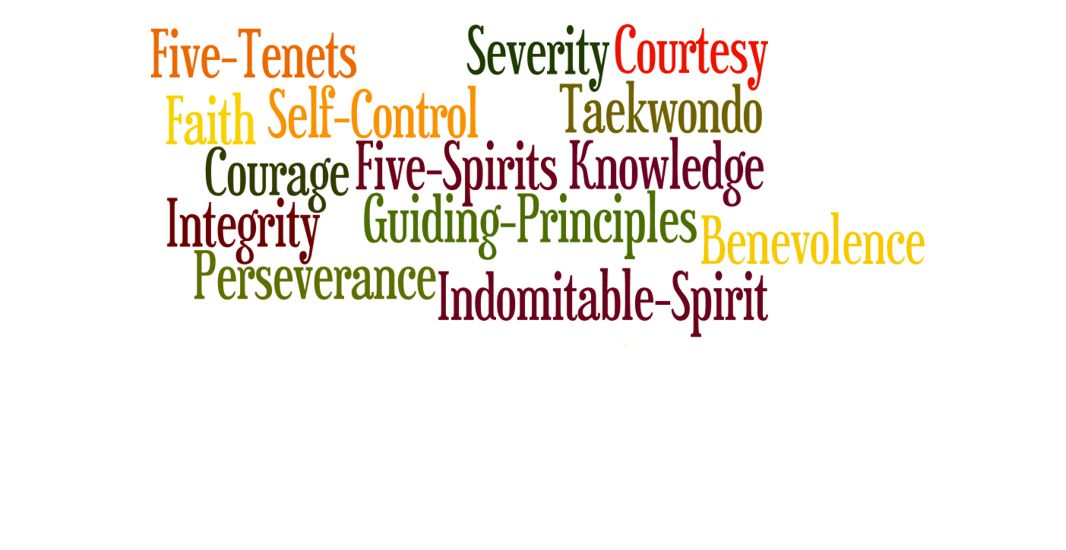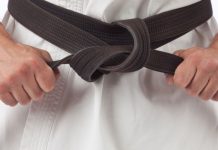In Tae Kwon Do, there are five tenets. These are guiding principles. They are Courtesy, Integrity, Perseverance, Self-Control and Indomitable Spirit. In my school there are five spirits: Knowledge, Faith, Benevolence, Courage and Severity.
In Tae Kwon Do, there are five tenets. These are guiding principles. They are Courtesy, Integrity, Perseverance, Self-Control and Indomitable Spirit. In my school there are five other principles that are taught first, at the beginning of our study of this hallowed martial art. They are Knowledge, Faith, Benevolence, Courage and Severity, the five spirits of Tae Kwon Do that we recite every day as lower belts.
Severity is the one that I find the most interesting.
We do not normally associate the idea of being severe with good and right conduct. But since the founding principle of Tae Kwon Do is that we must use our discipline to help others, it can only be that we cultivate severity in the service of others. Why, and how?
One meaning of severity is “maintaining a scrupulously exacting standard of behavior or self-discipline.” Another meaning is “strongly critical” as in “a severe critic.” Yet another is “causing discomfort or hardship,” as in “a severe winter.” When we promise to honor the tenets and spirits of Tae Kwon Do, we must have a concrete idea of what we are saying. If not, then our promise is empty and our daily practice hollow.
So, the question must be asked: what does severity mean when put into practice?
Practitioners of the martial arts willingly embrace a degree of austerity. The clothing we wear in practice is regulated by certain standards, and always the same. The dojang is a place of effort, not luxury. We do not go there to be comfortable. We go there to test ourselves. Our practice cannot evolve without discipline in other areas, as well. There is no martial artist who will succeed dramatically without restraint at the dinner table, so good habits outside the dojang also have to be maintained. This involves deliberately choosing not to indulge in the consumption of much that the broader society enjoys by way of leisure. We train rather than sit in front of the television at night. We pass on the meal that looks and is delicious, because weight gain is not the path to excellence. It isn’t easy and in the end, we have to direct severity inward as we ask much of ourselves.
There is also a kind of severity that we must extend outward. The dojang may be a place of safety, but the world is not. Practice is not just exercise or training of the mind, it is also preparation for real life. In martial arts it involves preparing for an attack that may entail a life or death struggle in which only one can win. Nothing could be more serious. To respond to unprovoked aggression in a half-hearted fashion would ensure defeat and seal our fate, as well as the fates of those who may depend upon us for protection.
In this, there is a kind of tension. We prepare to repel attacks, not initiate them. There is an inherently peaceful purpose and mindset associated with that approach. And yet, at the same time, once a fight has been brought to us we must be unremitting in our swift execution of technique designed to devastate and dispatch our enemy. It can make our practice exciting but also a bit awkward, as we have to perfect techniques that require us to slam a good friend down on the floor when he or she trains with us.
Throughout everything, severity in execution must be present if the martial art is to be perfected. There can be no half measures, only victory.
Throughout everything, severity in execution must be present if the martial art is to be perfected. There can be no half measures, only victory. As a result we must internally balance ruthless precision with the calm deliberation that guarantees that the blows we strike will land well and true, on the right target in the right way at the right time, and not otherwise. Severity carries with it a high responsibility, and requires a great deal of thought before action.
Finally, there is a species of severity that verges on the philosophical. Philosophy, in its etymology, refers to the love of knowledge. Severity serves philosophy in that, when we physically and mentally push ourselves to the very outer limits of our capabilities, we get better acquainted both with ourselves and with the truth.
Once, during a particularly strenuous training session, I heard my master shout “pain is just weakness leaving the body!” That may not always be true, but in the context of the dojang and our efforts there he was absolutely right. We can do more than we think we can do. Pain is always in the way, and pain is partly mental and physical in nature. There is so much pain between us and the achievement of excellence that it must exist for a reason, so that we may overcome it. Pain is not just an obstacle to be surmounted, but also our teacher and guide. In its fires, character is forged.
Now, when I finish a kick or punch with the kihop spirit yell, in the back of my mind I am thinking about severity. If severity in all of its good aspects is present, then the kihop will transmit resounding energy. It will ring true.
That’s something worth practicing, for a lifetime.











